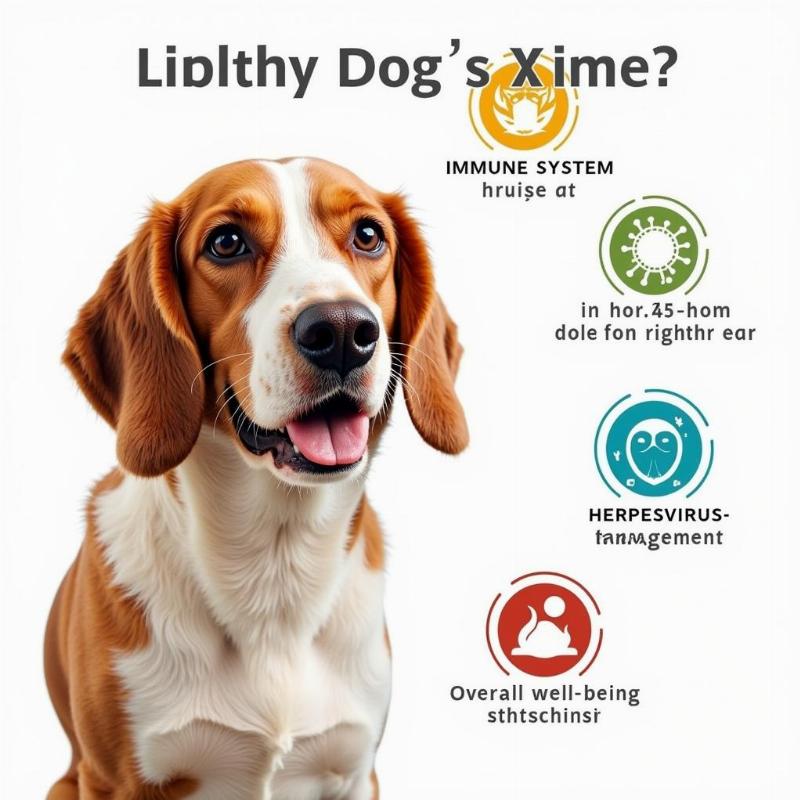L-lysine for dogs has gained popularity as a supplement for various health issues. But what exactly is the correct l-lysine dosage for dogs, and how can it benefit your furry friend? This comprehensive guide will explore the uses, benefits, and potential side effects of l-lysine for dogs, providing you with the information you need to make informed decisions about your pet’s health. We’ll cover everything from understanding the appropriate dosage to recognizing potential signs of lysine deficiency.
Understanding L-Lysine and Its Benefits for Dogs
L-lysine is an essential amino acid, meaning dogs cannot produce it on their own and must obtain it through their diet or supplementation. It plays a crucial role in various bodily functions, including calcium absorption, collagen formation, hormone and enzyme production, and immune system function. For dogs, l-lysine is often used to support immune health, manage herpesvirus infections, and promote overall well-being. Specifically, it’s been shown to be beneficial for conditions like feline herpesvirus (FHV-1), which can also affect dogs, and canine herpesvirus.
 L-lysine Benefits for Dogs
L-lysine Benefits for Dogs
Determining the Correct L-Lysine Dosage for Dogs
The appropriate l-lysine dosage for dogs varies depending on the dog’s weight, the reason for supplementation, and the specific product being used. Always consult with your veterinarian before starting your dog on any new supplement, including l-lysine. They can assess your dog’s individual needs and recommend the appropriate dosage and form of l-lysine. Generally, the recommended dosage ranges from 500-1000 mg per day for adult dogs. For puppies, the dosage is typically lower. Your veterinarian will guide you on the best approach for your dog.
L-Lysine for Specific Canine Health Concerns
L-lysine is often used to support dogs dealing with specific health issues. For example, it may help manage feline herpesvirus (FHV-1) symptoms in dogs, although this is less common than in cats. It can also potentially help with canine herpesvirus. Additionally, some dog owners use l-lysine to support immune function and overall health.
Potential Side Effects and Precautions
While generally considered safe, l-lysine can potentially cause some side effects in dogs, such as digestive upset, including diarrhea and vomiting. It’s important to start with a lower dose and gradually increase it as directed by your veterinarian. Always monitor your dog for any adverse reactions and contact your veterinarian immediately if any concerns arise. Avoid giving l-lysine to pregnant or lactating dogs without veterinary guidance.
What are the Signs of Lysine Deficiency in Dogs?
Lysine deficiency in dogs is rare, but it can occur. Signs may include fatigue, loss of appetite, anemia, reproductive issues, and impaired growth in puppies. If you suspect your dog might have a lysine deficiency, consult your veterinarian for diagnosis and treatment recommendations.
Conclusion
L-lysine can be a valuable supplement for dogs when used appropriately and under the guidance of a veterinarian. Understanding the correct l-lysine dosage for dogs and its potential benefits is crucial for responsible pet ownership. Remember to always consult your vet before adding any new supplements to your dog’s diet, including l-lysine, to ensure its safety and efficacy.
FAQ
-
How do I give my dog l-lysine? L-lysine is available in various forms, including tablets, capsules, powders, and treats. Follow your veterinarian’s instructions for administration.
-
Can I give my dog human l-lysine? It’s best to use l-lysine products specifically formulated for dogs. Human formulations may contain other ingredients that are not safe for dogs.
-
What if my dog misses a dose? Don’t give a double dose. Simply resume the regular dosage schedule as prescribed by your veterinarian.
-
How long does it take for l-lysine to work in dogs? The effects of l-lysine may vary depending on the individual dog and the reason for supplementation. Consult your veterinarian for expected timelines.
-
Can l-lysine interact with other medications? Inform your veterinarian of all medications and supplements your dog is currently taking to avoid potential interactions.
-
Where can I buy l-lysine for my dog? L-lysine supplements for dogs are available at pet stores, veterinary clinics, and online retailers.
-
Is l-lysine a cure for canine herpesvirus? L-lysine is not a cure for canine herpesvirus but can be used to manage symptoms and support the immune system.
Beautdogs.us is your premier source for comprehensive and reliable information on dog breeds, care, and products specifically tailored for the US market. We offer expert advice on everything from nutrition and training to health and wellness, empowering both new and experienced dog owners to provide the best possible care for their furry companions. Contact us at [email protected] or +1 501-555-7529 for personalized guidance. Visit Beautdogs.us today for all your dog-related needs!